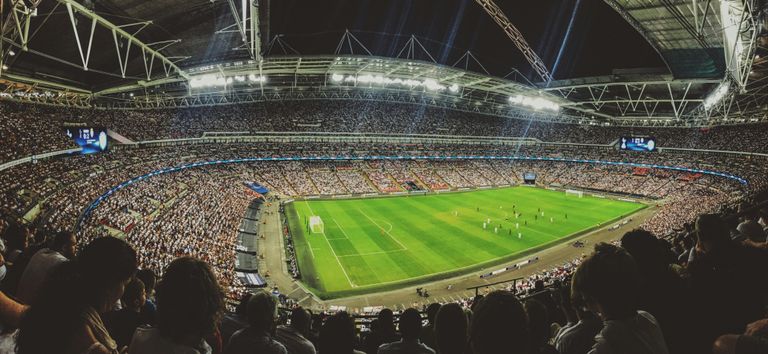
Warren S. McCulloch, from the electronics laboratory of the Massachusetts Institute of Technology, said in April 1966 (La Razón, Buenos Aires, 26-4-66) that... “a computer cannot change its mind, like man, fourteen times in three tenths of a second”. And he added that man can do so because he possesses a trillion computer neurons with a total of two million separate biological components.
Surely Warren S. McCulloch did not think he was “talking soccer” when he made that statement.
But the man reflected in that scientific conclusion is the same man who plays soccer and mindlessly produces everything that will register a soccer game between twenty-two men, a ball and, in addition, a host of circumstances beyond the control of those men.
It is this “common man”, despite always being the same player, the same gifted, gifted or not gifted, who will always make two matches where the same men play and apparently the same different visible circumstances. But never “the same” among those beyond human control.
It is that “common man” who is to blame for the “near futility” of this book and perhaps all its companions.
It is that common man, not only unequal to all men but constantly unequal to himself, who will make unequal two “equal” soccer games thought of in the same way; two car trips in a big city by the same driver and under the same driving treaty.
And more, much more, when it comes - like soccer or driving a car - to overcome antagonistic factors as changeable and unforeseen as fluctuations in the ideas of “our individual” or “our team”.
There was a sportscaster in the 1980s who called soccer “the passion of the crowds” and began all his stories that way. That commentator's name, now gone, was José María Muñoz.
Whatever the common mortals want to say about me, since I am not unaware of how badly even the stupidest people talk about stupidity, I am, however, the only one, and precisely the only one, who has the power to amuse gods and men. And it is a powerful proof of this, and it is well represented, that as soon as I appeared before this multitudinous assembly to address you, all your countenances have suddenly reflected a new and unusual joy, your foreheads have wrinkled and you have applauded with joyful and warm laughter, so that, indeed, all those present seemed to me drunk with nectar not exempt from nepentine, like the Homeric gods, while before you sat with a sad and hurried face, as if you had just come out of Trofoni's lair, and you had just come out of Trofoni's lair with a sad and hurried face.
In every sporting confrontation there is an opposition to overcome. Even in the loneliest races against the harmless clock. But in individual sports, the direct opposition is passive.
In soccer it is combative. It is total opposition.
In individual action sport no one deprives anyone of his basic competitive instrument.
If two painters compete at the same time and for the same reason to establish a circumstantial hierarchy of artistic values, one painter will not deprive the other of his brush.
An athlete fights against the distance, against the tool, against the hurdle, against the rod, against his fatigue... but without an adversary restricting his movement, or taking away the discus, the shot, the javelin, the pole vault or the hammer.
Soccer is played with the accepted law of the right of dispossession of the basic tool of the game.
This is - for soccer, rugby, basketball and all the collective sports of direct opposition - a condition that makes absurd, impossible, a repeated comparative pretension of many spirits prone to be dazzled by the luminosity of the technological dialectic, which does not discriminate between technique and humanity in that pretension to recast, in a common presupposition of methodization, the specific activities of a soccer player with those of an operator, those of an athlete in any individual sports competition, and even those of a comedy artist. The latter is frequent, and not only in soccer neophytes; even in those who are supposedly soccer experts, either because of weakness of convictions or for fear of being out of time, of not speaking “to the rhythm” of an era... deceitful. Euphemistic.
We talk about the systematized dedication of each one to his profession (the footballer certainly has it in contemporary society) and we assimilate them all to the same opposing factors, but without ever remembering that in soccer we do fundamentally what the adversary allows us to do, and then what we want to do ourselves. ... in all other cases of feigned comparison, the human achievement is exclusively what the protagonist is able to do, totally free from the risk of someone taking away the piano on which he plays music, the brush with which he paints, the pole vault with which he jumps or the bicycle with which he runs.
For these cases there may be, and moreover not permanently, a technique. But for soccer it is idle to speak of a technique, of a way to play well, of a rule to play or “see better” a game, since there will be many fluctuating, changing, surprising, unforeseen, spontaneous humanities... which will impose the validity of many techniques. The technique of the unforeseen above all the foreseen. And even more: to limit this technique to the use of the most untamed of man's possessive weapons, the feet, always more untamed than the hands at the command of the brain.
Spontaneity cannot be methodical in any order of things. Moreover: we have never, in any order of things, seen a virtuous man emerge only because he was “taught” to be virtuous. The surgeon, the musician, the soccer player, all have to be born virtuous to become virtuous through their different natural paths: some by training, others by manifesting themselves.

Warren S. McCulloch, del laboratorio de electrónica del Instituto Tecnológico de Massachusetts, decía en abril de 1966 (La Razón, Buenos Aires, 26-4-66) que... "una computadora no puede cambiar de opinión, como el hombre, catorce veces en tres décimas de segundo". Y agregó que el hombre puede hacerlo porque posee un billón de neuronas informáticas con un total de dos millones de componentes biológicos separados.
Seguramente Warren S. McCulloch no pensó que estaba "hablando de fútbol" cuando hizo esa declaración.
Pero el hombre reflejado en esa conclusión científica es el mismo hombre que juega al fútbol y produce sin pensar todo lo que registrará un partido de fútbol entre veintidós hombres, un balón y, además, un sinfín de circunstancias ajenas a la voluntad de esos hombres.
Es este “hombre común”, a pesar de ser siempre el mismo jugador, el mismo dotado, dotado o no dotado, el que siempre hará dos partidos donde jueguen los mismos hombres y aparentemente las mismas circunstancias visibles diferentes. Pero nunca "lo mismo" entre los que están más allá del control humano.
Es ese "hombre común" el que tiene la culpa de la "casi inutilidad" de este libro y quizás de todos sus compañeros.
Es ese hombre común, no sólo desigual a todos los hombres sino constantemente desigual a sí mismo, quien hará desiguales dos partidos de fútbol "iguales" pensados de la misma manera; dos viajes en coche en una gran ciudad por el mismo conductor y bajo el mismo tratado de conducción.
Y más, mucho más, cuando se trata -como el fútbol o la conducción de un coche- de superar factores antagónicos tan cambiantes e imprevistos como las fluctuaciones en las ideas de "nuestro individuo" o "nuestro equipo".
Hubo un comentarista deportivo en la década de 1980 que llamó al fútbol "la pasión de las multitudes" y comenzó todas sus historias de esa manera. El nombre de ese comentarista, ya desaparecido, era José María Muñoz.
Cualquier cosa que el común de los mortales quiera decir de mí, ya que no ignoro lo mal que hasta los más estúpidos hablan de estupidez, soy, sin embargo, el único, y precisamente el único, que tiene el poder de divertir a los dioses y a los hombres. Y es una prueba poderosa de esto, y está bien representado, que tan pronto como me presenté ante esta multitudinaria asamblea para dirigirme a ustedes, todos sus semblantes han reflejado repentinamente una alegría nueva e inusual, sus frentes se han arrugado y han aplaudida con risas alegres y calurosas, de modo que, en verdad, todos los presentes me parecían ebrios de néctar no exento de nepentina, como los dioses homéricos, mientras que ante vosotros estabais sentados con el rostro triste y apresurado, como si acabarais de saliste de la guarida de Trofoni, y acababas de salir de la guarida de Trofoni con una cara triste y apresurada.
En todo enfrentamiento deportivo hay una oposición a vencer. Incluso en las carreras más solitarias contra el inofensivo reloj. Pero en los deportes individuales, la oposición directa es pasiva.
En el fútbol es combativo. Es oposición total.
En el deporte de acción individual nadie priva a nadie de su instrumento competitivo básico.
Si dos pintores compiten al mismo tiempo y por la misma razón para establecer una jerarquización circunstancial de valores artísticos, un pintor no despojará al otro de su pincel.
Un atleta lucha contra la distancia, contra la herramienta, contra la valla, contra la vara, contra su fatiga... pero sin que un adversario le restrinja el movimiento, o le quite el disco, la bala, la jabalina, el salto con pértiga o el martillo.
El fútbol se juega con la ley aceptada del derecho al despojo de la herramienta básica del juego.
Esta es -para el fútbol, el rugby, el baloncesto y todos los deportes colectivos de oposición directa- una condición que hace absurda, imposible, una reiterada pretensión comparativa de muchos espíritus proclives a dejarse deslumbrar por la luminosidad de la dialéctica tecnológica, que no discrimina entre técnica y humanidad en esa pretensión de refundir, en un presupuesto común de metodización, las actividades específicas de un futbolista con las de un operador, las de un atleta en cualquier competición deportiva individual, e incluso las de un artista de la comedia. Esto último es frecuente, y no solo en los neófitos del fútbol; incluso en los que supuestamente son expertos en fútbol, ya sea por debilidad de convicciones o por miedo a quedarse fuera de tiempo, a no hablar "al ritmo" de una época... engañosa. Eufemístico.
Hablamos de la dedicación sistematizada de cada uno a su profesión (el futbolista ciertamente lo tiene en la sociedad contemporánea) y los asimilamos a todos a los mismos factores contrapuestos, pero sin recordar nunca que en el fútbol hacemos fundamentalmente lo que el adversario nos permite. hacer, y luego lo que queremos hacer nosotros mismos. ... en todos los demás casos de comparación fingida, el logro humano es exclusivamente lo que el protagonista es capaz de hacer, totalmente libre del riesgo de que alguien le quite el piano en el que toca la música, el pincel con el que pinta, el salto con pértiga con la que salta o la bicicleta con la que corre.
Para estos casos puede existir, y además no de forma permanente, una técnica. Pero para el fútbol es ocioso hablar de una técnica, de una forma de jugar bien, de una regla para jugar o “ver mejor” un partido, ya que habrá muchas humanidades fluctuantes, cambiantes, sorprendentes, imprevistas, espontáneas... lo que impondrá la validez de muchas técnicas. La técnica de lo imprevisto por encima de todo lo previsto. Y más aún: limitar esta técnica al uso de la más indómita de las armas posesivas del hombre, los pies, siempre más indómitos que las manos a la ordenación del cerebro.
La espontaneidad no puede ser metódica en ningún orden de cosas. Además: nunca, en ningún orden de cosas, hemos visto surgir a un hombre virtuoso solo porque se le "enseñó" a ser virtuoso. El cirujano, el músico, el futbolista, todos tienen que nacer virtuosos para volverse virtuosos a través de sus diferentes caminos naturales: unos entrenándose, otros manifestándose.

Source initial image / Fuente imagen inicial: Unsplash by Mitch Rosen
Source finalimage / Fuente imagen final: Unsplash by Connor Coyne



Sources consulted (my property) for the preparation of this article. Some paragraphs may be reproduced textually.
Fuentes consultadas (de mi propiedad) para la elaboración del presente artículo. Algunos párrafos pueden estar reproducidos textualmente.
| Argentina Discovery. |  | |
|---|---|---|
| Galería Fotográfica de Argentina. |  | |
| Viaggio in Argentina. |  |